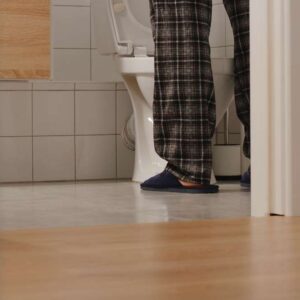
The Diabetes Game-Changer Your Doc Forgot to Mention
A senior patient of mine, diagnosed with diabetes, recently got a continuous glucose monitor (CGM)—and it has been an absolute game-changer.
With constant monitoring, her A1C—a crucial long-term measurement of blood sugar control—is now right where it should be.
And here’s the bonus: her daughter can help her keep an eye on her blood sugar, even when they’re not together.
There’s just one thing that frustrates me about CGMs.
If you’re diabetic and your doctor hasn’t spoken with you about CGMs yet, it may frustrate you too….
Frankly, I’m baffled.
Far too many doctors still aren’t recommending CGMs to their older adult patients with diabetes—despite plenty of evidence that they work incredibly well for this population.
Maybe they assume seniors can’t handle the technology, or have concerns about cost. Whatever the reason, it’s doing a disservice to millions of older adults who could benefit enormously from this technology.
In fact, new research makes it clear that CGMs aren’t just helpful for older adults with diabetes—they’re potentially life-changing.
A comprehensive study published in Diabetes, Obesity, and Metabolism analyzed 353 participants, comparing 142 people who used a CGM with 211 controls who stuck with traditional blood sugar monitoring methods.
The results were impressive.
At the start of the study, both groups had similar A1C levels—around 8.0 percent for CGM users and 7.9 percent for the control group. The American Diabetes Association recommends keeping A1C below 7 percent for most adults.
Here’s where things get interesting—within just three months after starting to use CGMs, the monitored group’s A1Cs dropped by 0.50 percent, while the control group’s levels barely budged at 0.02 percent.
And this wasn’t just a short-term improvement that faded over time. The benefits persisted throughout the entire study period, with significant A1C reductions lasting up to 24 months.
Now that drop might not sound like much, but in diabetes management, every fraction of a percent is significant. An A1C reduction of even half a percent can significantly lower the risk of serious complications like kidney disease, nerve damage, and vision problems.
Let’s take a quick look at why CGMs work so well:
- Instead of relying on finger stick tests a few times a day, CGMs provide continuous real-time feedback about blood sugar trends. You can see if your levels are rising, falling, or stable—and act accordingly.
- Many CGMs allow family members to monitor readings remotely. This is huge for adult children who worry about their parents’ diabetes management but can’t be there 24/7.
- Traditional glucose meters only tell you what your blood sugar is at one moment in time. CGMs show you where it’s headed, which is often more important for making treatment decisions.
- While some calibration might still be needed, CGMs dramatically reduce the number of painful finger pricks required for monitoring blood sugar.
- Many older adults worry about dangerous overnight blood sugar drops. CGMs can alert you (and family members) to concerning trends even while you’re sleeping.
- Seeing how different foods, activities, and medications affect blood sugar in real-time helps optimize timing and dosing of diabetes medications.
If you’re managing diabetes and your doctor hasn’t discussed CGMs with you, it’s worth bringing up.
Don’t let assumptions about age or technology comfort levels keep you from a tool that could significantly improve your quality of life.
P.S. “Doomed to diabetes?” not with THIS $3 supplement solution.
Source:
Riemer A. Been MD, Max R. X. van Helsdingen BSc, Darren Zammit BSc 2, Marco Grzegorczyk PhD, et al., The efficacy of intermittent scanning continuous glucose monitoring in the elderly: A case–control study, Diabetes Obes Metab. 2025;27:3882–3890, DOI: 10.1111/dom.16417
Written By Dr. Scott Olson, ND
Nearly 25 years ago, failed mainstream medical treatments left Dr. Olson in constant pain – and his health in ruins. And that’s when he did something REVOLUTIONARY. He began his career in medicine – and dedicated his life to uncovering the true, underlying causes of disease.
Through his innovative medical practices in Tennessee and Colorado, Dr. Olson has helped cure countless seniors from across America of arthritis… heart disease… diabetes… and even cancer. All without risky prescription drugs or painful surgeries.
View More Free Articles
Mailbag: End Midnight Bathroom Runs with These 6 Natural Fixes
“Thank you for your Living Well Daily newsletter! Can you please share any thoughts on how to support prostate health? Especially getting up and going to the bathroom twice a night. The stream is not as strong as it once was; it takes longer to empty. Thanks!” —Night Shift Hi Shift, Thank you for being...
The Brain Secret That DEFIES Aging
We’ve all heard the bad news when it comes to brain aging—shrinking volume, fading memory, slower reaction times. But new research from the German Center for Neurodegenerative Diseases (DZNE) delivers an unexpected—and uplifting—twist. Parts of your brain don’t just resist the aging process… they can actually get stronger. Let’s take a closer look… In a...
The Simple Secret to Better Health (No Gym Membership Required)
Let’s be honest—fitness culture is downright exhausting. You’ve probably encountered those ultra-dedicated exercise enthusiasts who turn every conversation into a masterclass on extreme workouts. They’re the ones posting their 5 AM CrossFit sessions and talking about their latest “beast mode” routine. And hey, good for them! But here’s the thing—you don’t need to become a...
Could This Gut Bug Outperform Ozempic?
Unless you’ve been living under a rock you’ve likely heard of Ozempic and similar GLP-1 drugs. They’ve been making headlines for their ability to help with blood sugar control—and, in many cases, weight loss. If you’re overweight or diabetic you may have even considered taking a GLP-1. But these drugs aren’t perfect. They can be...
Mailbag: 5 Tips to Dodge the Fall COVID Spike
“COVID is spreading through my family like wildfire. We’re thinking it’s the latest variant. Are there any new recommendations for protecting yourself against it? My spouse and I have tested negative so far, but we want do everything we can to dodge it this time around.” –Dodging Variants Hi Dodging, The “Nimbus” variant (NB.1.8.1) has...
Childhood Pastime “Rewires” the Parkinson’s Brain?
If you or someone you love is living with Parkinson’s disease, you know how relentless it can be. The stiffness. The tremors. The way even small, everyday tasks—buttoning a shirt, pouring a cup of coffee—can feel like a battle. It’s more than just the physical symptoms, too. Parkinson’s changes the way the brain communicates with...
The Sweet Deception Raising Your Diabetes Risk
You’ve probably seen the commercials… A trim person cracks open a can of diet soda and smiles about the healthy choice they’ve made. After all, no sugar, no calories—what’s not to like? But according to a new study, that seemingly “smart” swap might be quietly sabotaging your health. Researchers from Australia and the Netherlands have...
The Dirty Truth Lurking in Your Laundry Basket
If you’ve ever peeled off a pair of socks after a long summer day and caught a whiff of something foul… you’re not imagining things. That smell? It’s not just sweat. It’s the result of a full-blown microbial party happening between your toes. And for seniors—especially those with diabetes or compromised immune systems—this isn’t just...
STRANGE Sleep Fix Sitting in Your Fridge Right Now
It’s not the kind of advice you hear every day… “Sleeping poorly? Eat more fruits and veggies.” From counting sheep to weighted blankets, people have come up with countless ways to try to get a good night’s rest. But what if the solution to better sleep has been sitting in your produce drawer all along?...
The Hidden Dangers of Polypharmacy
Lately, I’ve had patients coming to see me with shopping bags full of medications(yes, actual shopping bags), often prescribed by different doctors who never talk to each other. If you’re like most folks our age, your medicine cabinet resembles a small pharmacy—a few prescriptions here, some over-the-counter (OTC) remedies there, and maybe a handful of...









